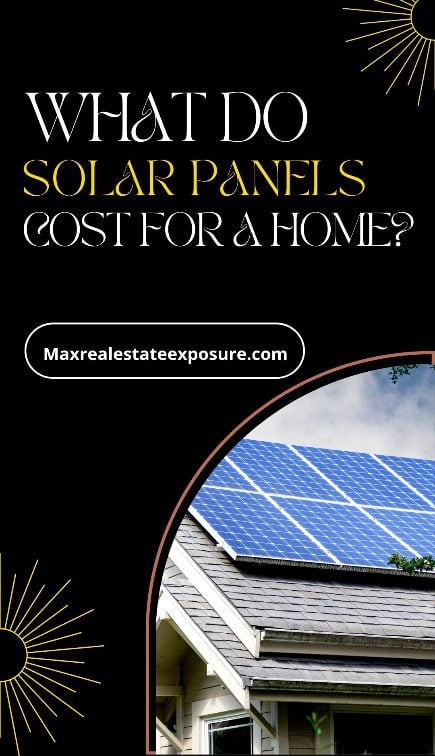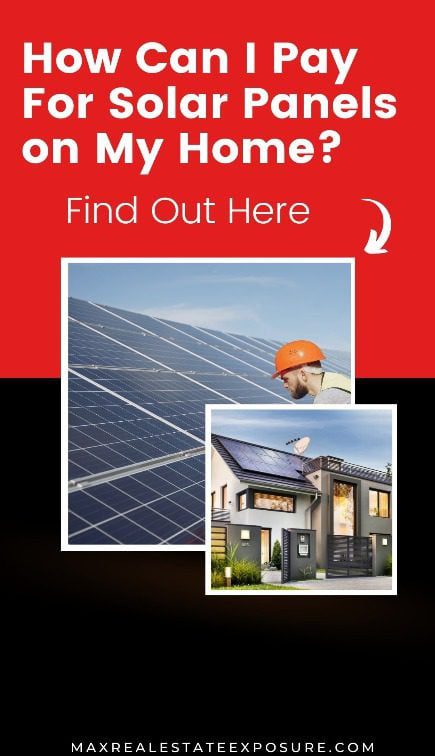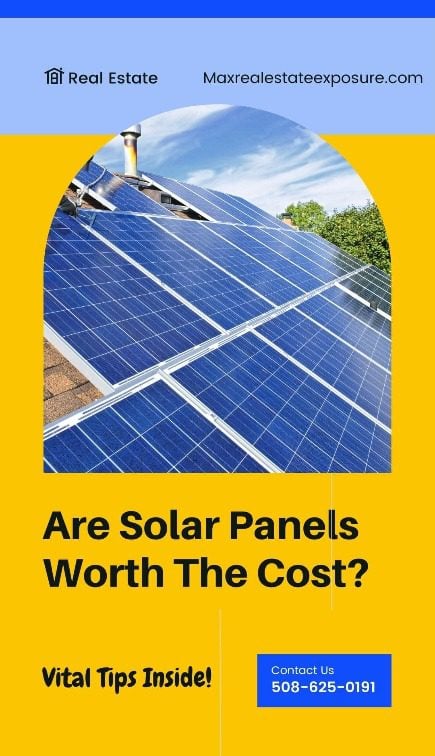 Solar panel costs and their value are important considerations for homeowners. Factors like installation, panel quality, and incentives can impact the overall cost. Understanding the potential savings and payback period is crucial.
Solar panel costs and their value are important considerations for homeowners. Factors like installation, panel quality, and incentives can impact the overall cost. Understanding the potential savings and payback period is crucial.
Financing options, including leasing and loans, play a role in making solar panels more accessible. Additionally, solar energy offers environmental benefits and can increase property value.
We will explore the average cost of solar panels, installation factors, and their overall worth.— Solar panels can be a cost-effective investment with long-term benefits for homeowners.
However, if you plan on selling your home soon, the expense may not be worth it. In my experience as a real estate agent approaching forty years, the market value added for having solar panels is not significant.
Many of my clients ask if solar panels increase home value. The answer is yes in some circumstances, but not to the degree solar panel companies tell you. If you spend twenty-five thousand on solar panels and have to sell your home in a couple of years, don’t expect to get all that money back.
Sometimes you will get an insignificant return if the panels are located on the front of your home, creating an eye soar. Let’s review everything you need to know about solar panels. This is especially true when selling luxury homes.
How Much Do Solar Panels Cost For Homes?
When considering the installation of solar panels for your home, it’s essential to understand the costs involved. The price of solar panels can vary based on several factors that affect their overall cost. These factors include the type and quality of panels, installation fees, system size, and location-specific considerations.
The average cost of a 6kW solar panel system runs between $10,000-$16,000. These costs can vary tremendously. For example, the average cost of solar panel installation in Massachusetts is over $21,000, whereas in Arizona, it’s $14,000+.
Consumer Affairs has an excellent resource that breaks down the average cost by state. See what you can expect to pay for solar power installation based on location.
Let’s explore the key factors that influence the cost of solar panels.
Factors That Affect Solar Panel Costs
Various factors can impact the cost of solar panels for residential installations. These factors include the following:
- Solar panel quality and efficiency: Higher-quality panels with better efficiency tend to be more expensive. However, they can generate more electricity over their lifespan, resulting in long-term savings.
- System size: The size of the solar panel system you choose will affect the overall cost. Larger systems can produce more electricity but are generally more expensive upfront.
- Installation fees: The installation cost, including labor, equipment, and permits, will vary depending on the complexity of the installation and local regulations.
- Incentives and rebates: Federal and state incentives and local rebates can significantly reduce the upfront cost of solar panel installation.
- Roof condition and orientation: Factors such as the condition and material of your roof and its orientation towards the sun can affect installation costs. You must factor that expense into the installation if your roof needs replacement.
It’s essential to understand that the cost of solar panels can vary significantly from home to another. To determine the exact cost for your specific situation, it’s recommended to consult with reputable solar panel installers who can provide accurate estimates based on your property’s unique factors and requirements.
How Much Do Solar Panels Save?
Investing in solar panels can lead to significant financial benefits for homeowners. Not only can you reduce or eliminate your monthly electricity bills, but you can also take advantage of various incentives and tax credits to maximize your savings.
The Financial Benefits of Solar Energy
One of the primary financial benefits of solar energy is the potential for long-term savings on your electricity bills. By generating your clean energy, you can significantly reduce your reliance on the grid and the associated costs.
In addition, as utility rates tend to increase over time, your solar panels allow for predictable and stable energy costs. This can protect you from future electricity price hikes, providing you with substantial savings in the long run.
Federal and State Incentives for Solar Panels
The federal government and many states offer various incentives to promote the adoption of solar panels. One notable federal incentive is the investment tax credit (ITC), which allows you to claim a percentage of your solar panel system’s cost as a tax credit. As of 2023, the ITC provides a 30% credit for residential solar panel installations.
Moreover, state-specific incentives, such as rebates and grants, can further reduce the upfront costs of installing solar panels. These incentives vary by state, so it’s essential to research and take advantage of the available programs in your area.
Understanding Solar Tax Credits and Rebates
Along with the federal investment tax credit, you may also benefit from additional tax credits and rebates at the state and local levels. These incentives can vary significantly, so it’s crucial to consult local resources or speak with a qualified tax professional to understand the specific advantages in your area.
By carefully navigating and understanding these tax credits and rebates, you can significantly offset the initial cost of installing solar panels and accelerate your return on investment.
- Savings on electricity bills
- Predictable and stable energy costs
- Federal investment tax credit (ITC)
- State-specific incentives, rebates, and grants
- Additional tax credits and rebates at state and local levels
Considering the financial benefits of solar energy, including potential savings on electricity bills and the various incentives available, you can make an informed decision about investing in solar panels. These financial advantages, combined with the environmental benefits and potential increase in property value, make solar panels a worthwhile investment.
How Can I Pay for Solar Panels?
 Several financing options are available when installing solar panels to make the investment more affordable. By exploring these options, homeowners can determine the best approach for their financial situation.
Several financing options are available when installing solar panels to make the investment more affordable. By exploring these options, homeowners can determine the best approach for their financial situation.
Here are some standard financing options:
Financing Options for Solar Panel Installation
One option for paying for solar panels is through traditional financing sources, such as personal savings, home equity loans, or lines of credit. Utilizing personal savings can be straightforward, especially for homeowners with funds for home improvements.
Alternatively, accessing home equity through a loan or line of credit can provide the necessary capital for solar panel installation.
Solar Panel Leasing vs. Buying
Another choice to consider is whether to lease or buy solar panels. Leasing allows homeowners to install solar panels without upfront costs. Instead, they pay a monthly lease fee to the solar company that owns the system.
However, it’s important to note that leasing may not provide as many long-term financial benefits as purchasing.
On the other hand, buying solar panels outright gives homeowners ownership and the potential for more significant financial advantages.
While the initial investment may be higher, owning the system allows homeowners to take advantage of substantial savings over time. It also provides the flexibility to benefit from various incentives and tax credits.
Here is an excellent comparison from Forbes about leasing vs. buying solar panels that’s worth a look.
Ultimately, the decision between leasing and buying solar panels depends on individual circumstances, financial goals, and long-term plans for the property.
Selling a house with leased solar panels can be more troublesome. Remember to keep this in mind.
Exploring Solar Loan Programs
Solar loan programs are specifically designed to help homeowners finance the installation of solar panels. These loans often offer competitive interest rates and flexible repayment terms. By exploring solar loan programs provided by local banks or specialized solar financing institutions, homeowners can find options tailored to their needs.
These loans typically allow homeowners to retain ownership of the solar energy system while paying off the loan balance over time. The savings generated by solar panels can help offset the monthly loan payments, making it an affordable and attractive financing solution.
In summary, financing options for solar panels include personal savings, home equity loans, lines of credit, leasing arrangements, and solar loan programs. Each option has its unique advantages and considerations.
Homeowners should carefully evaluate their financial situation and long-term goals to determine the most suitable payment method for their solar panel installation.
How Long Does It Take to Break Even on Solar Panel Costs?
When investing in solar panels, one crucial factor is the payback period or the time it takes to recoup the initial costs. Calculating the payback period involves considering various factors and determining when the savings from solar energy offset the installation expenses.
Calculating the Payback Period for Solar Panels
To calculate the payback period, several key elements come into play. These include the initial installation cost, the electricity generated by the solar panels, the current cost of electricity, and any applicable incentives or tax credits.
By dividing the initial installation cost by the estimated annual savings on electricity bills, you can determine the number of years it will take to break even. For example, if the installation cost is $20,000 and the annual savings are $2,000, the payback period would be ten years.
Considering the Lifetime Savings from Solar Energy
While the payback period helps understand when the initial investment is recovered, it’s essential to consider the lifetime savings from solar energy. Solar panels have a lifespan of over 20 years, during which they continue to generate electricity and save on monthly bills.
Over the long run, homeowners can save thousands of dollars on electricity costs. These savings accumulate over the panels’ lifespan, allowing homeowners to enjoy a significant return on investment.
Additionally, as utility rates rise over time, the savings from solar panels become even more pronounced. By generating clean and renewable energy, homeowners can shield themselves from fluctuating energy prices while making a positive environmental impact.
The exact break-even point and lifetime savings will vary based on location, energy consumption, and the specific system installed. However, solar panels offer a viable and financially beneficial solution in the long term.
Are Solar Panels Worth The Cost?
 When considering whether solar panels are worth investing in, evaluating the return on investment (ROI) is essential. While the initial cost of installation and purchasing solar panels may seem high, the long-term financial benefits can outweigh the upfront expenses.
When considering whether solar panels are worth investing in, evaluating the return on investment (ROI) is essential. While the initial cost of installation and purchasing solar panels may seem high, the long-term financial benefits can outweigh the upfront expenses.
Evaluating the Return on Investment (ROI) for Solar Panels
Calculating the ROI involves assessing the total savings in energy costs over time compared to the initial investment in solar panels. Factors like the cost of electricity, panel efficiency, and local sunlight exposure impact the ROI.
Determining the break-even point, where the accumulated savings surpass the initial investment, provides insights into the long-term financial benefits. On average, homeowners can expect to recoup their investment within six to ten years, depending on various factors.
Environmental Benefits of Solar Energy
In addition to financial considerations, solar panels offer significant environmental benefits. By harnessing clean, renewable energy from the sun, solar panels reduce reliance on fossil fuels, decrease greenhouse gas emissions, and minimize the carbon footprint.
Switching to solar energy contributes to a more sustainable future, promoting clean air and combating climate change. Homeowners can take pride in reducing their environmental impact and being part of the renewable energy movement.
Impact on Property Value
Incorporating solar panels into a property not only offers financial and environmental benefits but can also have a positive impact on its value. Solar panels are a desirable feature, attracting environmentally conscious buyers and potentially increasing resale value.
Studies have shown that homes with solar panels sell faster and at a higher price than homes without solar installations. Prospective buyers appreciate the long-term energy savings and the ability to generate clean energy, making solar-powered homes an attractive investment.
However, remember many factors go into the return on investment. Look at the resource provided at the start of the article for considerations on what influences the ROI. If you’re considering adding solar panels to your house, you can ask a real estate agent to perform a comparative market analysis.
The agent should look at similar homes sold with and without the panels. What was the difference? Doing this exercise should give you an idea of what to expect when selling.
Average Cost of Solar Panels
The cost of solar panels can vary depending on various factors. Understanding the installation costs and key pricing factors is essential when considering solar panel systems.
Installation Costs and Pricing Factors
The installation costs of solar panels typically include purchasing the panels themselves, labor costs, and additional components required for the system. Pricing factors that can influence the overall cost include:
- Solar panel quality and technology: Higher quality panels and advanced technologies may result in higher upfront costs.
- System size: The size of the solar panel system needed to meet your energy requirements can affect the overall cost.
- Roof type and condition: Your roof’s type and shape may impact the installation’s complexity and cost.
- Permitting and inspection fees: Depending on your local jurisdiction, there may be associated fees for obtaining permits and conducting inspections.
- Additional equipment: In some cases, other equipment, such as batteries or inverters, may be required, adding to the overall cost.
The Cost of Solar Panels Systems: Key Considerations
When evaluating the cost of solar panel systems, it’s crucial to consider the following factors:
- Return on investment (ROI): Calculate the payback period to understand how long it will take for the energy savings to offset the initial investment.
- Incentives and tax credits: Explore federal and state incentives, such as tax credits and rebates, that can significantly reduce the overall cost of solar panel installation.
- Financing options: Understand the financing options available, including loans and leases, to determine the most suitable method for your financial situation.
- Lifetime savings: Consider the long-term savings on your electricity bills over the lifespan of the solar panel system, typically over 20 years or more.
- Environmental benefits: Solar energy significantly reduces carbon emissions and helps create a more sustainable future for the environment.
- Impact on property value: Installing solar panels can increase the value of your property, making it a wise investment for homeowners.
Final Thoughts on Solar Panels Costs
By carefully considering the installation costs, pricing factors, and critical considerations, homeowners can make informed decisions regarding the average cost of solar panels and determine if they are worth the investment.
About the Author: The above Real Estate information on how much solar panels cost was provided by Bill Gassett, a Nationally recognized leader in his field. Bill can be reached via email at billgassett@remaxexec.com or by phone at 508-625-0191. Bill has helped people move in and out of Metrowest towns for 37+ Years.
Are you thinking of selling your home? I am passionate about real estate and love sharing my marketing expertise!
I service Real Estate Sales in the following Metrowest MA towns: Ashland, Bellingham, Douglas, Framingham, Franklin, Grafton, Holliston, Hopkinton, Hopedale, Medway, Mendon, Milford, Millbury, Millville, Northborough, Northbridge, Shrewsbury, Southborough, Sutton, Wayland, Westborough, Whitinsville, Worcester, Upton, and Uxbridge MA.

